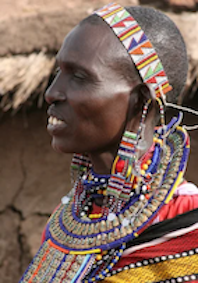Tanzania: Catholic community supports beleagured Maasai

Photo by Jan Canty on Unsplash
A Catholic community in Tanzania's Ngorongoro Crater region have, for many months, been bearing witness to attempts by Tanzania's national government to squeeze out indigenous Maasai communities from their traditional lands, by cutting health services in a long-established clinic.
The clinic, which has been run by the Catholic church since 1965, has suffered cuts to water and electricity, and the operators have been refused permits to upgrade or renovate the facility. In addition, the facility was downgraded from 'hospital', to a 'clinic' a move that was accompanied by the suspension of ambulance and emergency services - a situation which has caused great distress for those acutely ill in the community.
A report by Doreen Ajlambo, in Global Sisters' Report on October 9, 2023 also documents the harassment and abuse of the religious leaders, including nuns, priests and catechists, whom the government have attempted to silence through arrest and detention in retaliation for the religious community's support of the Maasai position.
Fr Julius Malema - using a pseudonym - who has been repeatedly arrested for his work in Ngorongoro defending the Maasai, said: "As a priest who has worked here for a very long time, I feel disappointed with how the government is handling things by treating people like they are unworthy."
One of the nuns in the district also stated that Maasai women and girls are beaten and raped during the increasingly violent evictions being enacted by the government in its campaign to push through its policy of removing the Maasai from their longstanding home inside the Ngorongoro Crater, a UNESCO World Heritage Site since 1979.
International rights monitor Amnesty International said in its June 6, 2023 report on the issue that the national government, in 2009, unilaterally restricted human activities in the crater, purportedly in preservation of the environment. The Maasai, however, have for generations enacted their nomadic lifestyle there, famously maintaining a balance between Maasai community needs and that of tourism entities in the area, and nature. The Amnesty report continues by cataloguing a shocking litany of abuses of the Maasai's traditional lifestyle through no fewer than four cycles of forced removal and evictions since 2009. Earlier evictions began as long ago as the 1950s, when Maasai were removed from the Serengeti National Park.
In March 2024 the online campaigning organisation Avaaz alerted the international community to the ramping up of plans to continue to forcibly remove the Maasai from Ngorongoro. States Avaaz's article on the evictions: "President Samia Suluhu Hassan may not listen to us, but we know she'll respond to media and public pressure."
Ironically, these developments are in direct contravention of innovative work that has been carried out in South Africa since the 1994 advent of democracy. In contrast with the exclusionary policies of apartheid, private sector lodges across the country routinely work with local communities in ongoing processes of skills transfer, job creation, profit sharing - but perhaps most importantly, dialogue, where great efforts are made to record indigenous knowledge and create joint efforts at managing issues such as poaching, primary health, unemployment and education in deeply rural areas - and conservation.
With its own sickening history of forced removals that were a regular feature of the 20th century, the former 'polecat' of the world has created important precedents, and, whilst there is still a long way to go to fully address historical injustices, these approaches are, today, at least foundational protocols embedded within private/public sector developments.
The Maasai themselves are more than aware of these approaches. One of the Catholic catechists at Ngorongoro, himself a Maasai, said: "The government should engage the Maasai leaders and find a lasting solution to the problem. The authorities should help people and wildlife to coexist in ways that benefit both, instead of violating the rights of the Maasai."
In a recent development reported by Katie McQue in the Guardian, thousands of Maasai have written to the British and UK governments appealing for help to stop the evictions. It is clear from the various reports reviewed that the Maasai suspect their lives are being sacrificed for tourism developments that have been approved without their involvement. The Guardian report cites another disputed locale near the Kenyan border, where Maasai face eviction to make way for a purportedly-United Arab Emirates-owned hunting company.
Academics are very concerned too. Quoted in the Guardian, Anuradha Mittal, executive director of the Oakland Institute thinktank, likened the situation to that prevailing under the most repressive years of colonial rule, and a guest essay the New York Times in February 2024 by Robert Williams, a law professor and faculty chair of the Indigenous peoples law and policy programme at the University of Arizona pointed out that, around the world, indigenous communities have by far the best record of maintaining the balance between people and nature. Says Williams: "… an estimated 476 million Indigenous people dwell on lands that are home to 80 percent of the world's biodiversity."
Whilst the world sounds the alarm, the Catholic community of Ngorongoro continues to speak truth to power despite attempts to muzzle them. Church personnel speak of killings; of disappearances; and of the bullying tactics of authoritarian states that wish to stifle dissent, including press harassment. Nuns in the region are visiting abused families to support them, caring in particular for traumatised evicted women and children caught in the long running and exhausting dispute. Catholic personnel are also supporting Maasai men with information about legal avenues of protest, as well as seeking to create dialogue aimed at bringing the conflict to a negotiated end where tourism can flourish - but also the Maasai.


















